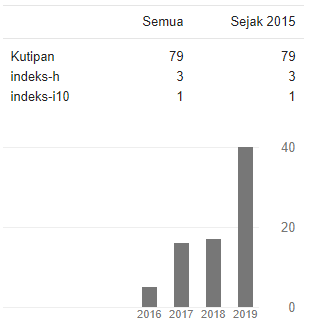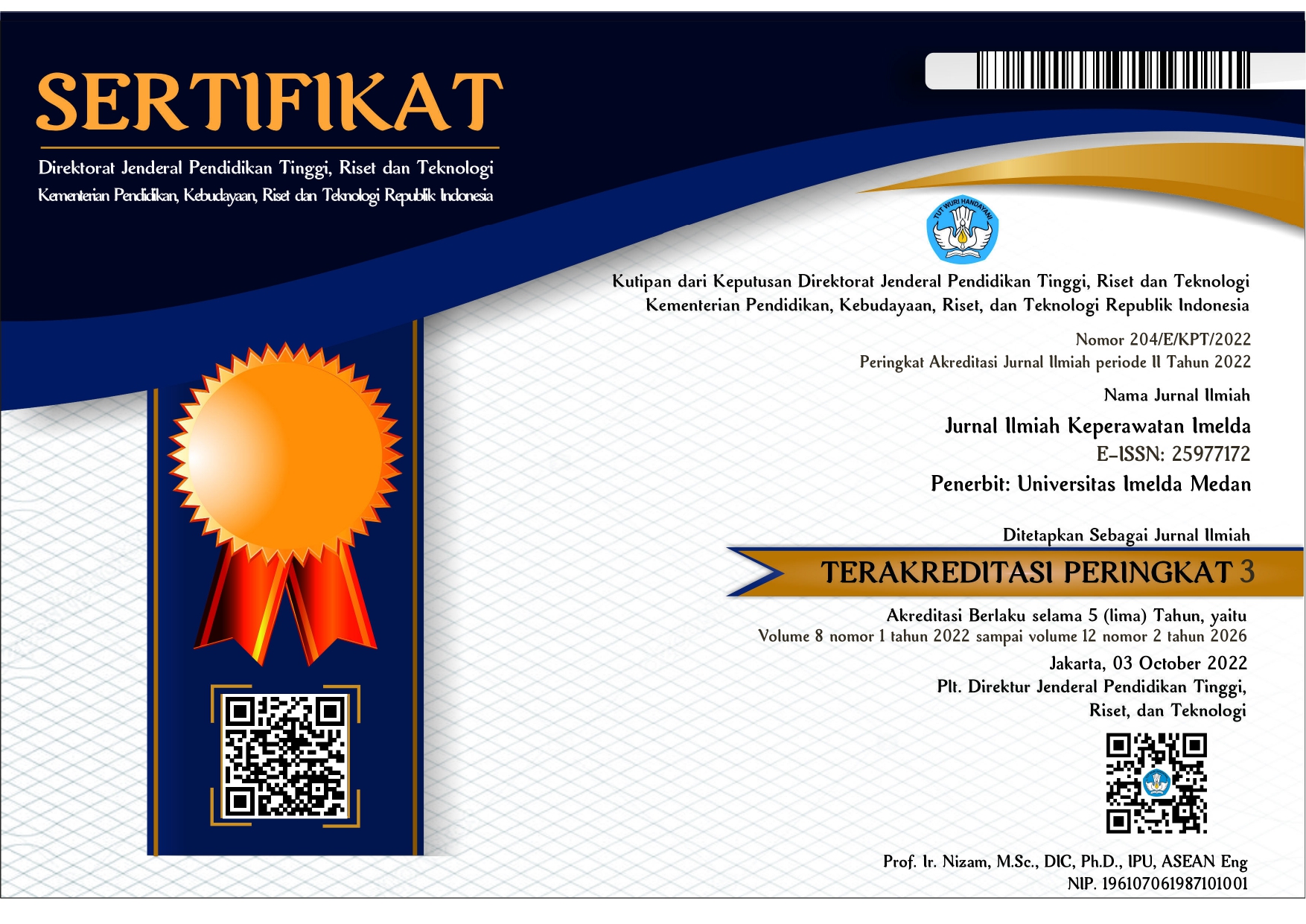HUBUNGAN SELF EFFICACY DAN KESEJAHTERAAN SPIRITUAL DENGAN PENGGUNAAN STRATEGI KOPING PADA ORANG DENGAN HIV (ODHIV)
DOI:
https://doi.org/10.52943/jikeperawatan.v11i2.1598Keywords:
Self-Efficacy, Spiritual Wellbeing, Coping StrategiesAbstract
HIV infection continues to be a significant public health problem worldwide, including Indonesia, with impacts spanning social, economic, and cultural aspects. People living with HIV (PLHIV) are faced with various pressures and are in dire need of coping strategies. This study aimed to determine the relationship between self-efficacy and spiritual well-being with the use of coping strategies in PLHIV. This study is an analytic study with a cross sectional approach. A sample of 39 ODHIV was selected using purposive sampling method. Data were collected by filling out the GSES questionnaire to assess self-efficacy, the SWBS questionnaire to measure spiritual well-being, and the BRIEF RCOPE questionnaire to determine coping strategies. Logistic regression multinomial inferencial test found no association between self-efficacy and spiritual well-being with the use of coping strategies. Most were male (76.9%), high school education level (64.1%), and married (59%). Descriptive analysis obtained respondents who used problem-oriented coping strategies (28.2%); emotion-oriented (38.5%); and religious-oriented (33.3%). Multinomial logistic regression test showed no significant association between self-efficacy and the use of coping strategies and no association between spiritual well-being and coping strategies (p-value > 0.05). Spiritual aspects are important to consider as they can be a source of coping and motivation to help patients cope with sudden illness and reduce the level of pain due to the perceived condition so as to quickly move towards healing. Nurses need to apply nursing care using coping instruments, comprehensively from the assessment process to the evaluation process.
Downloads
References
Andang Purnomo. (2017). Hubungan Kesejahteraan Spiritual dengan Mekanisme Koping pada Pasien Hemodialisa di Instalasi Dialisis RSUP Dr. Sardjito Yogyakarta [Universitas Alma Ata Yogyakarta]. http://elibrary.almaata.ac.id/1476/2/Naskah Publikasi.pdf
Brown, M. J., Serovich, J. M., Laschober, T. C., Kimberly, J. A., & Lescano, C. M. (2020). Ways of Coping and HIV Disclosure among People Living with HIV: Mediation of Decision Self-Efficacy and Moderation by Sex. 31(8), 1001–1010. https://doi.org/10.1080/09540121.2019.1605045.Ways
Fitriawan, A. S. (2018). Self Efficacy Dalam Mematuhi Pengobatan Antiretroviral Therapy Pada Pasien Hiv / Aids. Nursing Journal Respati, 5(September), 467–478.
Hariyadi, & Puji. (2018). Perbedaan Strategi Koping Pada Pasien Hiv Yang Berkeluarga Dan Belum Berkeluarga Dikomunitas Lsl (Lelaki Seks Dengan Lelaki) Poli Vct Rsj Menur Surabaya. Perbedaan Strategi Koping Pada Pasien Hiv Yang Berkeluarga Dan Belum Berkeluarga Dikomunitas Lsl (Lelaki Seks Dengan Lelaki) Poli Vct Rsj Menur Surabaya, 7–45.
Hidayati, A. Y., & Wardani, I. Y. (2014). Gambaran Strategi Koping Pasien Hiv/Aids Di Poliklinik Napza Rumah Sakit Dr. H. Marzoeki Mahdi Bogor. Jurnal Keperawatan Jiwa, 2(2), 100–109.
Ningsih, F. H., Azaam, R., & Mustikasari, M. (2020). Kesejahteraan Spiritual dengan Kejadian Infeksi Oportunistik pada ODHA. Jurnal Keperawatan Silampari, 4(1), 66–76. https://doi.org/10.31539/jks.v4i1.1618
Nursalam. (2013). Asuhan keperawatan pada pasien terinfeksi HIV/AIDS. Salemba Medika.
Nuwa. (2019). Penanganan Terhadap Stigma Masyarakat tentang Orang Dengan HIV/AIDS (ODHA) di Komunitas. Jurnal Penelitian Kesehatan Suara Forikes, 10(1), 49–54. https://doi.org/http://dx.doi.org/10.33846/sf.v10i1.310
Parker. (1986). Coping in Stressful Episodes: The Role of Individual Differences, Enviromental Factor, and Situastional Characteristic. Journal of Personality and Social Psychology, Vo. 51.6, 1277–1292.
Permenkes Nomor 23. (2022). Penanggulangan Human Immunodeficiency Virus, Acquired Immunodeficiency Syndrome, dan Infeksi Menular Seksual (Issue 8.5.2017).
Priharwanti, A., & Raharjo, B. B. (2018). Problems Focused Coping Penderita HIV Positif. Public Health Perspective Journal, 2(2), 131–139.
Rodkjaer, L., Chesney, M. A., Lomborg, K., Ostergaard, L., Laursen, T., & Sodemann, M. (2014). HIV-infected individuals with high coping self-efficacy are less likely to report depressive symptoms: A cross-sectional study from Denmark. International Journal of Infectious Diseases, 22, 67–72. https://doi.org/10.1016/j.ijid.2013.12.008
Salami, S., Muvira, A. A., & Yualita, P. (2021). Studi Kualitatif Strategi Koping Penderita HIV AIDS di Kota Bandung. Faletehan Health Journal, 8(01), 22–30. https://doi.org/10.33746/fhj.v8i01.243
Sastra, L. (2019). Hubungan Kesehatan Spiritual Dengan Kualitas Hidup Orang Dengan Hiv/Aids Di Yayasan Lantera Minangkabau Support Padang. Jurnal Kesehatan Mercusuar, 2(2). https://doi.org/10.36984/jkm.v2i2.62
Sitorus, R. J. (2021). Determinan Self Efficacy Pada Orang Dengan Hiv/Aids (Odha) Di Kota Palembang.
Siyoto, S.-, Peristiowati, Y.-, & Agustin, E.-. (2016). Analisis Faktor Yang Berhubungan Dengan Mekanisme Koping Pada Odha Dengan Pendekatan Teori Adaptasi Callista Roy. Jurnal NERS, 11(2), 256. https://doi.org/10.20473/jn.v11i22016.256-260
Zyga, S., Mitrousi, S., Alikari, V., Sachlas, A., Stathoulis, J., Fradelos, E., Panoutsopoulos, G., & Maria, L. (2016). ASSESSING FACTORS THAT AFFECT COPING STRATEGIES AMONG NURSING PERSONNEL. Materia Socio-Medica, 28(2), 146–150. https://doi.org/10.5455/msm.2016.28.146-150
Downloads
Published
How to Cite
Issue
Section
License
Copyright (c) 2025 Jurnal Ilmiah Keperawatan IMELDA

This work is licensed under a Creative Commons Attribution-NonCommercial 4.0 International License.








